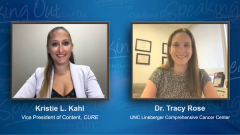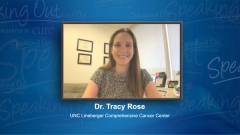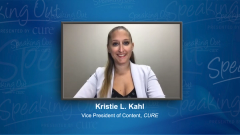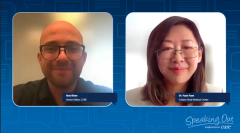
Living Well Beyond Bladder Cancer With Support
As part of its “Speaking Out” video series, CURE spoke with Dr. Tracy L. Rose, on behalf of the Bladder Cancer Advocacy Network, about support available for patients and caregivers following a bladder cancer diagnosis.
Episodes in this series
Kristie L. Kahl: To start, why is it important for patients to make sure that they're also living well beyond their treatment, whether it be physical or mental?
Tracy L. Rose: The whole point of treatment is really to keep patients living well. And so, that is the ultimate goal. And so, it has to be taken into account with all conversations. We know very well that exercise, emotional health, diet, etc., are so important for supporting people through treatment and through their cancer journey. And really what drives people is the activities they do outside the hospital and outside their clinic visits and their social connections and things like that. And so, it's really a huge focus of my clinic to try to focus on the living that people do despite their cancer, or with their cancer. It's so healthy to have goals and dreams outside of their cancer as well, that really helps people move from day to day and sort of drive people in general. And I think having personal connections and motivations and things is so great, too. Sometimes we can find (those things) in the context of support groups and other things that patients can actually seek out to help them live well beyond their treatment.
Kahl: What types of emotional or psychological affects can impact a patient with bladder cancer?
Rose: Yeah, so there's a huge array of life changes that can happen with bladder cancer, with any patient with cancer. Obviously, it's an emotional journey about, “Am I going to be okay? How bad am I going to feel? How is my family going to cope, or my friends or my loved ones, etc.?” Especially for people with underlying mental health disease, like depression or anxiety, it can really be a trigger or to set off prior issues they've had, but even people who don't have a prior history of that, just the normal coping can be incredibly stressful and difficult. And then if you add in the physical changes that some people get, you know, having bladder cancer can affect your sexual health, it can be fully changing for your body, affects your relationships with people and it can make you feel bad. And treatment can make you feel bad. And so, just having a physical inability to do things like care for yourself in a way that you used to be able to do, not be able to sit outside for three hours on your grandson's soccer game because it's too hot, etc, it can really impact people with cancer. And so finding ways to work through that and continue to live well is so important. One of the most powerful people that can help you through that, in addition to your oncologist, is someone else that's been through it. And so, reaching out for support to address some of these emotional or psychological changes or even physical things that you didn't realize you were going to have to deal with is really important.
Kahl: Why is support so crucial and why should patients make sure they're asking about it?
Rose: I think sometimes patients don't even realize what they're going through, if you will. They know that they have life changes, and that they're feeling stressed, etc but sometimes just connecting with someone that can either help them process it or has processed it themselves, and can reflect on what that was like, is really powerful. And so, to hear either someone else that has been through the same journey and how they approached it and got through it successfully, or even the stumbles along the way, I think are really motivating for people. And I think sometimes just knowing that you're not alone is really important. And that's actually very difficult to do within our hospital system. You know, we talk about HIPAA and confidentiality a lot, and sometimes what this results in is that we don't do a good job of connecting patients with others who have been in their shoes. And you know, we try to do that as best we can. But I always encourage people to sort of reach out to other resources to really help find people that have walked in their shoes before.
Kahl: To bring it all together, can you discuss some of the resources that are available at BCAN to help our patient audience?
Rose: BCAN is a really incredible organization, both from a patient perspective and clinician perspective, because they do such a good job not only bringing patients together, but bringing patients, the research world and the clinical world all together to make sure that what we are trying to achieve in the bladder cancer community is what people need. From a patient perspective, they have a vast array of resources that are really great. The ones that come to mind is a really robust online community so they have a wealth of information that you can find not only about medical terminology and treatment options that maybe people haven't heard before, but also connecting survivors with current patients and survivors. And so that's one really great resource they have out in person support groups around the country, we have a really active one here in the triangle that also does fundraisers, participates in the annual walk. And so that can all be really uplifting and also ways to get involved.
(With BCAN, you can) meet people and answer questions. I know our local group has talks that you can attend, where you can just ask medical questions with people that are really patient. And then they have this matching program called survival verb where; they can match people with someone else that's been through their diagnosis, too. And then, from the research perspective, there's a wealth of opportunity to get involved from an advocacy standpoint. So realizing where the research needs to go, helping the patient advocate on grant reviews and things like that can actually be really helpful for people, even from a bladder cancer perspective, because it really helps them feel like they're giving back to the community. So it's not for everybody, but it's a resource that's available. They even have conferences where patients can come and meet others on a national level, too.
Transcription edited for clarity and conciseness.








